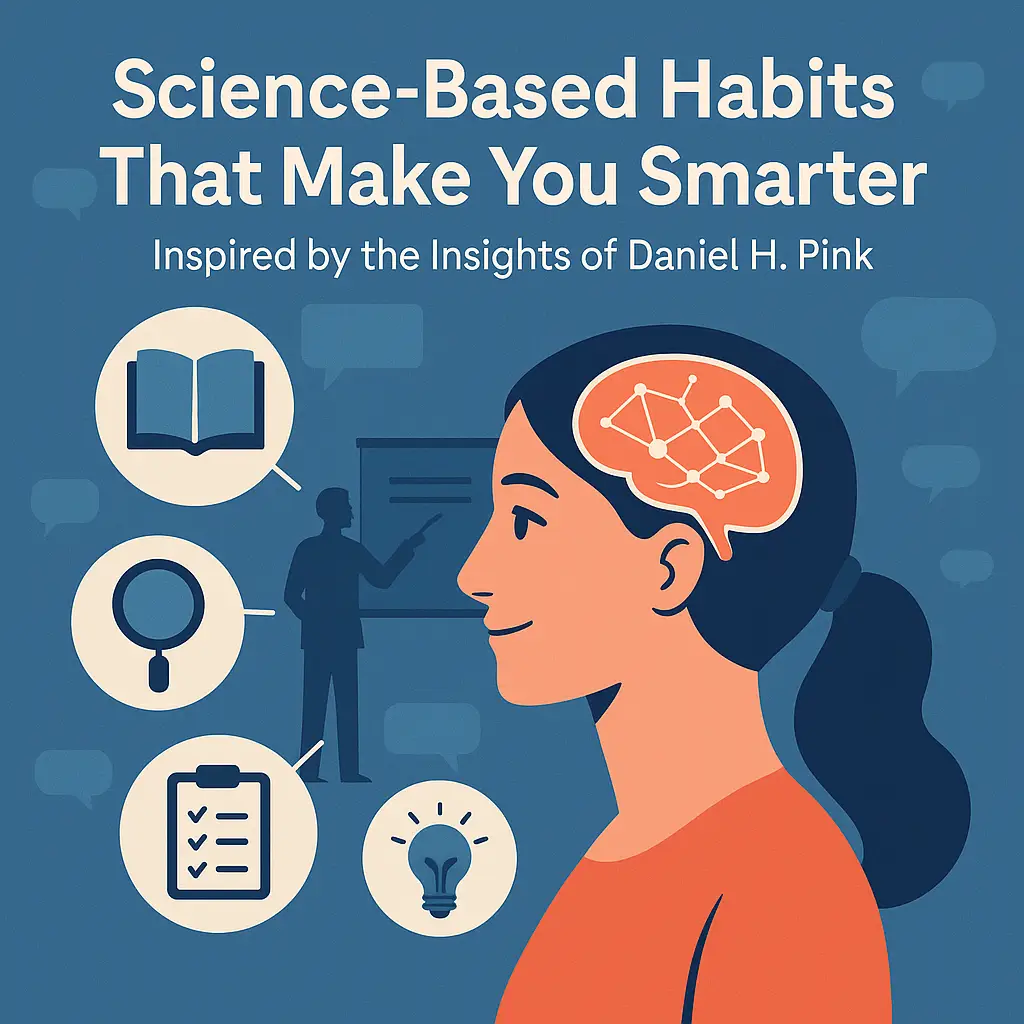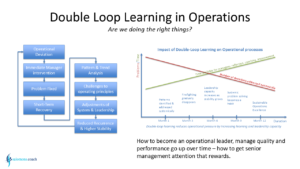Science-backed habits to make you smarter

Inspired by the insights of Daniel H. Pink
In the world of leadership, learning is not a luxury — it’s survival. The same applies if you are in between jobs. Especially in a VUCA environment, leaders who keep sharpening their thinking stay more adaptive, innovative, and resilient than those who rely only on past experience.
Recently, bestselling author Daniel H. Pink shared a set of science-backed habits that reliably increase cognitive performance. I am a big fan of Daniel and his work, as it is always grounded in behavioral science and human motivation, offers simple but powerful practices anyone can adopt.
Below is a reflection on these eight habits — with full credit to Daniel Pink — along with small, practical actions you can start today. But first, why these habits can be so important in two different contexts:
- VUCA: This stands for Volatility, Uncertainty, Complexity, Ambiguity, but you probably know this if you read my blog. If not, here is a post that fully explains VUCA and why looking at the world and organizations through this lens is so useful: VUCA defined, or click the ‘VUCA’ tag in the sidebar to see all my VUCA posts. These habits are fundamental in each aspect of VUCA.
- Leadership & Career Transition: Being in between jobs can have many reasons. Some are almost traumatic, others are deliberate choices to develop further, or to find a place that makes you happier, etc. Transition also take place internally as you develop yourself and move on. Whatever the reason, these habits will fully support the transition period.
What these habits mean for VUCA leadership
In a VUCA world (Volatility, Uncertainty, Complexity, Ambiguity), leaders don’t win by knowing more — they win by learning faster, adapting faster, and reflecting deeper.
Daniel Pink’s eight habits are not just “smart habits”; they are core resilience practices for modern leadership. Here’s how this connects:
- Volatility → Build Cognitive Stability: Teaching what you learn, testing yourself, and building a daily rhythm create mental steadiness in a volatile environment.
- Uncertainty → Grow Adaptive Thinking: Reflection, mono-tasking, and seeking friction help leaders tolerate uncertainty and respond with clarity instead of reactivity.
- Complexity → Strengthen Sensemaking: Sleep, movement, and retrieval learning literally sharpen executive functioning — the part of the brain that makes sense of complex systems, interdependencies, and stakeholder dynamics.
- Ambiguity → Increase Mental Agility: Small daily learning rituals build agility, curiosity, and perspective-taking — essential to navigate ambiguous situations without becoming overwhelmed.
VUCA leaders don’t need more information. They need better learning habits.
These eight habits are the foundation for becoming more grounded, self-aware, and strategically adaptive — exactly what teams need from their leaders today.
Connecting these habits to being in-between jobs
Redundancy is one of the most emotionally disruptive experiences in a professional life.
It’s not just a legal or HR process — it’s a psychological destabilizer. In my coaching I developed the 4R model – Reflect > Reset > Re-align > RiseTM. This is where Pink’s habits and my 4R model fit together beautifully. More on the 4R Model.
If you are not really in between, but you’re seeking the next step in your career, these habits also are very helpful in accelerating your development and personal growth.
Reflect – the emotional and cognitive reset: People who are made redundant often fall into rumination, self-blame, or emotional exhaustion. The habits of reflection, mono-tasking, and explaining what you’ve learned give structure and grounding when life feels chaotic.
They help people answer the reflective questions:
“What is happening to me mentally?”
“What do I need emotionally?”
Reset – breaking patterns that no longer serve: Redundancy is a forced pause. It creates a window to reset unhealthy routines:
- poor sleep
- constant multitasking
- absorbing negativity
- ignoring personal development
Pink’s habits allow people to rebuild their cognitive and emotional foundation.
Re-Align – choosing direction instead of drifting: This stage is where people reconnect with identity, career direction, and purpose. Habits like daily learning, physical movement, and seeking friction help people:
- rebuild confidence
- re-engage curiosity
- sharpen decision-making
- identify their strengths
- open new possibilities
This is where people shift from “What I lost” to “Who I can become next.”
Rise – rebuilding professional momentum: In this stage, people need energy, sharpness, and self-leadership to pursue new roles or career directions. Pink’s habits help them rise stronger by building:
- clarity of thinking
- resilience
- emotional regulation
- adaptability
- faster learning cycles
Exactly what employers value — and exactly what people need to feel in control again.
Why These Habits Matter for Leaders
In leadership development, I consistently see one pattern:
The smartest leaders are not those with the highest IQ,
but those with the most intentional learning habits.
Daniel Pink’s science-based practices are simple, practical, and incredibly effective. They help leaders become:
- Clearer thinkers
- Better decision-makers
- More resilient under pressure
- More open to new ideas
- More connected to themselves and others
In a fast-moving world, this is the real competitive advantage. Here are the habits…
8 Habits that make you smarter
1. Teach It to Learn It
Pink reminds us that if you can’t explain something simply, you don’t truly understand it.
Teaching forces clarity.
It exposes gaps.
And it strengthens recall.
Action: Pick one idea you learned this week and teach it — to a colleague, to your team, or even into your phone. Refine it until the explanation flows naturally.
2. Retrieval Beats Review
We think rereading helps us learn. It doesn’t.
Retrieval does.
Testing your memory solidifies learning far more effectively than passive review.
Action: Paste an article into an AI tool.
Ask it to generate 5–10 open-ended questions.
Answer → get feedback → repeat.
This is the learning loop top performers use.
3. Walk for Better Ideas
Pink highlights what science has shown for years: movement boosts creativity and cognitive flexibility.
Even a short walk unlocks new thinking.
Action: Take a 10–20 minute “thinking walk.”
For a fresh twist, choose a color and search for it while walking. Your attention sharpens — and so do your ideas.
4. Make It Harder to Read
This one surprises most leaders.
“Desirable difficulties” — small hurdles that force you to slow down — dramatically deepen learning. Switching to an ugly or unfamiliar font increases cognitive effort… and retention.
Action: Change your notes to an odd, slightly uncomfortable font.
Your brain will pay more attention.
5. Monotask (Please.)
Multitasking is the enemy of intelligence and focus.
Pink emphasizes what neuroscience already proves: your brain pays a high switching cost every time you jump between tasks.
Action: Choose one task.
Put your phone in another room.
Close all tabs.
Set a 25-minute timer.
Work.
Then take a 5-minute break.
Repeat.
You’ll think better — and finish faster.
6. Keep a Commonplace Book
Great thinkers throughout history kept a single place where ideas, quotes, observations, and questions lived together. Why? Because connections compound.
Pink encourages returning to this timeless practice.
Action: Create a 30-day challenge:
Capture one insight each day.
Review the collection every Sunday.
Patterns — and breakthroughs — will emerge.
7. Chew Gum for Sharper Recall
Yes, really.
Pink points to research showing that chewing gum temporarily increases alertness and improves memory, especially before performance moments like tests or presentations.
Action: Chew sugar-free gum for 10 minutes before an important meeting or mental task.
Spit it out right before you start.
A small boost — backed by science.
8. Practice Intellectual Humility
This one might be the most powerful habit of all.
Pink calls intellectual humility a superpower.
Leaders who can say “I might be wrong” make better decisions, learn faster, and build stronger teams.
Action: Keep a weekly “mistake log.”
Write down one belief you revised — and why.
Ask yourself regularly:
“What am I missing?”
This is not weakness. It’s wisdom.
Credit and Appreciation
This article is inspired entirely by the work of Daniel H. Pink, whose decades of research into human behavior, motivation, and performance continue to shape how leaders learn and grow.
Original ideas and framework belong to him; this post reflects and expands on them for leadership and coaching contexts.




